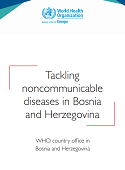Tackling noncommunicable diseases in Bosnia and Herzegovina (2018)

Download
The main public health challenge in Bosnia and Herzegovina is reducing noncommunicable diseases (NCDs): heart disease, stroke, cancer, diabetes and chronic respiratory disease. NCDs are estimated to account for 80% of the country’s annual deaths, and addressing them is the foremost public health priority in the country. They dominate the overall burden of disease and disability, as do the risk factors that contribute to them, such as high blood pressure, tobacco use and unhealthy nutrition. In 2016, cardiovascular diseases (CVDs) alone were the cause of approximately half of reported deaths and were among the leading causes of reported morbidity in family medicine and primary health care overall.
The project “Reducing Health Risk Factors in Bosnia and Herzegovina – Developing and Advancing Modern and Sustainable Public Health Strategies, Capacities and Services to Improve Population Health in Bosnia and Herzegovina” was developed jointly by the Swiss Agency for Development and Cooperation (SDC), the WHO Regional Office for Europe, the WHO country office in Bosnia and Herzegovina, and the health authorities in Bosnia and Herzegovina. Its first phase (2013–2018) was launched at the end of 2013.
The overall goal of the project is to reduce the burden of ill health from NCDs and achieve better health for the population. It aims to increase the public’s access to efficient, effective, good quality and equitable public health programmes and services that will reduce NCDs and their risk factors.



